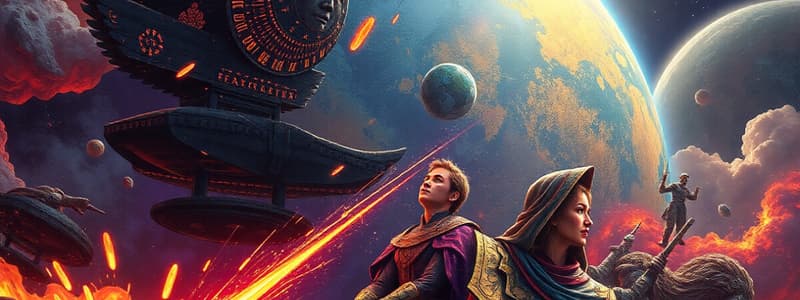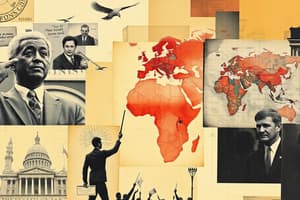Podcast
Questions and Answers
Which of the following is NOT considered a core principle in international relations?
Which of the following is NOT considered a core principle in international relations?
- Independence (correct)
- Dominance
- Identity
- Reciprocity
Nonstate actors have no influence on international relations.
Nonstate actors have no influence on international relations.
False (B)
In which era did the East-West rivalry dominate world politics?
In which era did the East-West rivalry dominate world politics?
Cold War
The process of _____ refers to the increasing interconnectedness of countries worldwide.
The process of _____ refers to the increasing interconnectedness of countries worldwide.
What was one major consequence of the U.S. military campaign in Iraq?
What was one major consequence of the U.S. military campaign in Iraq?
The NATO campaign in Afghanistan officially ended in 2012.
The NATO campaign in Afghanistan officially ended in 2012.
Name one major conflict that dominated the twentieth century.
Name one major conflict that dominated the twentieth century.
Match the following terms with their descriptions:
Match the following terms with their descriptions:
Flashcards
What is International Relations (IR)?
What is International Relations (IR)?
International Relations (IR) studies the interactions between states and other actors in the global political system.
Key principles in IR
Key principles in IR
Dominance, reciprocity, and identity are three key principles that shape how actors address shared problems in IR.
Which actors are most prominent in IR?
Which actors are most prominent in IR?
States are the primary actors in the international system, defined by their sovereignty and independence.
What are non-state actors in IR?
What are non-state actors in IR?
Signup and view all the flashcards
Define globalization
Define globalization
Signup and view all the flashcards
What was the Cold War?
What was the Cold War?
Signup and view all the flashcards
What are the key dynamics of the Post-Cold War era?
What are the key dynamics of the Post-Cold War era?
Signup and view all the flashcards
What were the effects of the US military campaign in Iraq?
What were the effects of the US military campaign in Iraq?
Signup and view all the flashcards
Study Notes
International Relations (IR)
- IR is a field of political science that analyzes international security and political economy.
- Key principles shaping solutions to collective problems include dominance, reciprocity, and identity.
- States are the primary actors in IR, operating within a system based on the sovereignty of ~200 independent states.
- Non-state actors (IGOs, NGOs, MNCs) are increasingly influential.
- IR analysis uses individual, domestic, and systemic levels of analysis.
- Globalization is a complex process of increasing worldwide interconnectedness.
- Globalization's impact on state power is debated.
- World Wars I and II had contrasting implications for foreign policy strategies.
- The Cold War (East-West rivalry) shaped global politics for decades, creating both conflict and stability.
- The post-Cold War era saw opportunities for peace but also new conflicts.
- The Iraq War divided powers, spurred anti-Americanism, and led to sustained conflict.
- The NATO intervention in Afghanistan ended, but some troops remained.
- Osama bin Laden was killed by U.S. forces.
- The Arab Spring uprisings sparked conflicts and regime changes.
- Recent events like Brexit and the election of Donald Trump suggest a global reaction against globalization.
Studying That Suits You
Use AI to generate personalized quizzes and flashcards to suit your learning preferences.




